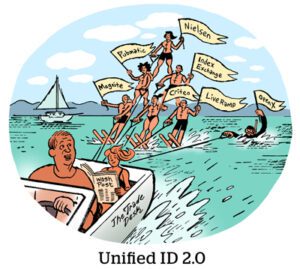Here’s today’s AdExchanger.com news round-up… Want it by email? Sign up here.
Ad Tech’s Open Intel
Starting in 2019, a government technology contractor named Mike Yeagley went on a roadshow of sorts, demonstrating to US intelligence agencies how ad tech data might be used to compromise Americans.
He was also a “scout” for US agencies in that he’d uncover private data and technology that they could employ themselves, writes Byron Tau at Wired.
Yeagley’s method for shock and awe – as with many privacy advocates – was to use commercial data licensed from Grindr to prove how the ad tech brokerage system could identify individuals within top-secret offices.
For example, say a phone with the Grindr app installed was seen to spend workdays at the Pentagon or FBI headquarters. Good chance that phone’s owner works for one of those agencies.
Before the Edward Snowden leak, intel agencies would simply hoover up mobile network and web browsing data by tapping fiber-optic cables and chokepoints, like cell towers and network infrastructure. After those revelations, tech companies began encrypting network communications.
“So it was a revelation,” Tau writes, “especially given the public outcry over Snowden’s leaks, that agencies could just buy some of the data they needed straight from commercial entities.”
Although perhaps not so surprising for anyone familiar with how the ad tech ecosystem works.
Reddit In The Red
Reddit, which is soon going public at last, faces an uphill climb, Eric Seufert writes at Mobile Dev Memo.
One issue is Reddit’s ”sub-scale” user base of 73 million daily active users, which pales in comparison to Snap (414 million) or Pinterest (249 million), let alone Facebook’s 2.1 billion daily actives.
Reddit’s DAUs are comparable to Threads, the Instagram sister app with next to no traction.
But Reddit is an important consumer product and research platform for its users. Yet Reddit doesn’t generate close to enough conversion data to get its own ad flywheel going.
Another problem is Reddit’s contextual targeting approach. Take, for example, the r/outdoors and r/camping subreddits. Both offer a contextually strong place for outdoor advertisers to reach relevant consumers. But, fact is, most of those advertisers would rather target people who just bought a tent.
Also, although Reddit points to data licensing as a source of revenue – it recently inked a $60 million annual deal to license data to Google – Seufert asks whether this isn’t an example of “eating the seed corn” (as in, consuming the means of production and sacrificing future value).
If that data is what makes Reddit special, why nearly give it away?
Performance You Can CTV
CTV ad-buying startup tvScientific, which bills itself as a performance marketing solution for streaming media, raised $9.4 million this week, bringing its total funding to $30 million.
That may not seem like an eye-popping round, but tvScientific has always used its fundraising to bring on strategic partners, and this time is no different.
NBCUniversal, Hearst Ventures and Aperiam Ventures, a fund backed by ad tech entrepreneurs and led by Undertone’s founder, Eric Franchi, and Joe Zawadzki of MediaMath fame, were already backers. This round is led by S4S Ventures backed by Sir Martin Sorrell, who also leads the ad agency and martech holding company S4 Capital. Also joining are Progress Ventures and BDMI, two funds focused on ad tech and digital media monetization.
NBCU, however, finds particular value in tvScientific because it helps attract performance marketers and digitally native brands that historically haven’t advertised on television but want TV reach and branding.
“The demand has always been there, but the tools weren’t,” Sanja Partalo, co-founder and managing partner at S4 Ventures, tells Ad Age.
But Wait, There’s More!
A deep dive into LiveRamp’s system of identity graphs. [Cracked Labs]
The copyright showdown between TikTok and Universal Music could have far-reaching implications for musicians and marketers. [WSJ]
Meta wants Llama 3 to handle contentious questions as Google grapples with the Gemini backlash. [The Information]
Audiences respond more favorably when AI-generated ad creative includes a disclosure, according to research from Publicis and Yahoo. [Adweek]
How the news industry keeps losing the future. [NYT]
DoubleVerify and Roku unmask a new CTV ad fraud scheme. [release]
The White House is cracking down on brokers selling US consumer data to China and Russia. [Mashable]
The Warner Bros. Discovery/Paramount Global merger is no more. [CNBC]
You’re Hired!
Digitalzone hires Sonjoy Ganguly as chief product officer and Thomas Koletas as CRO. [release]

















